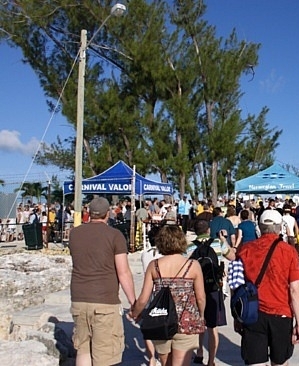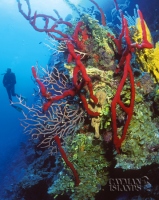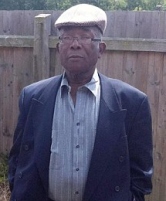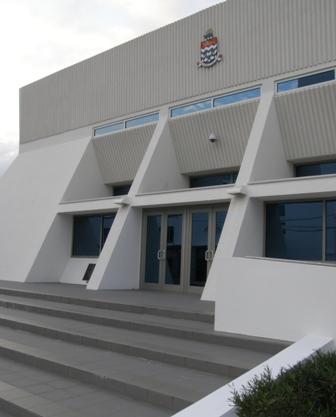Archive for September 7th, 2011

Spotts dock delayed
 (CNS): Plans to upgrade the Spotts dock area where cruise ships anchor during bad weather have been postponed until government completes its negotiations with China Harbour Engineering Company (CHEC), the premier revealed on Wednesday morning. Answering questions in the Legislative Assembly from the opposition leader about government's plans to develop cruise berthing facilities in George Town, McKeeva Bush said that because of interference from the opposition and then the audit office wanting to know things, the plans to start that project in July before the deal with CHEC was completed have been shelved. “I told the governor I was sick and tired of all this,” the premier said.
(CNS): Plans to upgrade the Spotts dock area where cruise ships anchor during bad weather have been postponed until government completes its negotiations with China Harbour Engineering Company (CHEC), the premier revealed on Wednesday morning. Answering questions in the Legislative Assembly from the opposition leader about government's plans to develop cruise berthing facilities in George Town, McKeeva Bush said that because of interference from the opposition and then the audit office wanting to know things, the plans to start that project in July before the deal with CHEC was completed have been shelved. “I told the governor I was sick and tired of all this,” the premier said.
Bush added that he had postponed the plan and had told the Chinese that government would not be going ahead with Spotts until the full agreement was in place.
Government signed an MOU with CHEC in June formalising negotiations for the Beijing based firm to finance and develop the two cruise piers in George Town and one in West Bay. Part of the MOU also included the refurbishment of the very poor facilities at Spotts, which Bush said he had wanted CHEC to begin working on immediately regardless of how negotiations progressed.
He explained that the planhad been for CHEC to begin that project and spend up to $3 milllion on the build out at the same time as negotiations continued towards the substantive agreement for the main cruise berth project.
Bush stated that had the government not been able to come to an agreement with the Chinese then it would have paid back the $3 million that CHEC would have spent on the Spotts facility but if a deal was reached it would have been part of that main agreement.
However, Bush said that because the opposition had complained about it the auditor started asking questions about where the $3 milllion was and where it was going and what account it was in, misunderstanding the goal. Bush said in his frustration he made the decision to defer the Spotts plans until the talks with the Chinese for all the elements of the deal are completed.
Bush stated that the MOU signed by the two parties is valid until November, when he hoped the main agreement would be signed, but he did not indicate how the negotiations for the George Town cruise port were progressing or what shape the deal would take.
The MOU with CHEC and the Cayman government was signed in June, two months after the premier's controversial decision to pull out of talks with GLF/ Royal Construction, a Caymanian/Italian partnership that said it was ready to break ground on the development within weeks of the definitive agreement, as it had then expected, being signed.
Since then, the firm has threatened to take legal action against the Cayman Islands Government as it says it had fulfilled of the elements required by the MOU and had a legitimate expectation that the government would move to a master agreement. The premier had taken a different view, however, and has since stated that he was within his rights to close down the talks with GLF as he did not think the firm had demonstrated its ability to finance the project.
At the time of pulling out of the GLF talks, Bush said he believed things were moving too slowly and had said there was a pressing need to get the cruise berthing going as soon as possible. When he then moved to formal negotiations with CHEC, despite the claim of urgency, the MOU provided for a five month talking period.

Marine Parks are working
 (CNS): The coral reefs of the Cayman Islands need to be healthier, with more fish and better coral protection, to improve their resilience so that they can withstand new threats, such as climate change, disease and population increase, scientists from the Department of Environment explained at the first of a series of meetings Monday night on Cayman Brac to educate the public on the state of the Cayman Islands Marine Protection programme and to explain why it needs to be continued and enhanced. The parks were created 25 years ago, but while successful, they need to be extended, which might be achieved by widening the boundaries along the coastline, but could also be done by extending the contours of the parks out from the shoreline.
(CNS): The coral reefs of the Cayman Islands need to be healthier, with more fish and better coral protection, to improve their resilience so that they can withstand new threats, such as climate change, disease and population increase, scientists from the Department of Environment explained at the first of a series of meetings Monday night on Cayman Brac to educate the public on the state of the Cayman Islands Marine Protection programme and to explain why it needs to be continued and enhanced. The parks were created 25 years ago, but while successful, they need to be extended, which might be achieved by widening the boundaries along the coastline, but could also be done by extending the contours of the parks out from the shoreline.
While the DoE and its partners from the University of Bangor in Wales and the US Nature Conservancy are working hard to gather hard scientific data to guide the decision making on the Marine Parks, they will also be asking for input from the public about to shape the vital protection of the marine environment in the future. The programme will only work if it has the support of the people, said Dr John Turner from Bangor University.
DoE Director Gina Ebanks-Petrie explained that the parks were initially established 25 years ago because of concerns over the rapid development of the islands, as well as the over fishing, especially of conch and lobster. However, there are now new threats to consider, mostly associated with climate change, such as a warming ocean, increases in sea surface temperature, increase in storm activity, ocean acidification and sea level rise. All it takes for coral bleaching, which has a devastating effect onthe reefs, is a rise in temperature of 1% for an extended period of time, she said.
A stressed reef is more vulnerable to disease, which can kill or weaken a reef structure. In addition, the population of the Cayman Islands has more than doubled, she said. With a weakened reef, there are less reef fish and so less fish to eat the algae, which then out-competes corals on the reef, creating a vicious circle of decline.
Dr Turner noted that Cayman still had a very rich and vibrant marine environment which had benefitted form the 25 years of protection and was known around the world as one of the best and most protected marine habitats. Compared to protected areas in most other countries, it is real and it is enforced, with good signage, legislation maps and marker buoys, he said.
While there are various zones, including environmental, no dive, wildlife interaction and replenishment zones, the no-take fishing zone covers only around 17% of Cayman’s shelf. Ideally this should be around 50%, Dr Turner said.
Partially funded by the UK Department of Environment’s Darwin Project, the scientists are currently reviewing the Marine Park system to see how it needs to be changed or enhanced. The gathering of data to assess the reef health is headed by Croy McCoy of the DoE, whose work on the project will also form the basis of his PhD. Once the scientific data is gathered, this, together with information collected from interviews, will be plugged into a sophisticated computer programme, which will produce various options as to the way forward. These options will then be presented to the public to find the best solution for Cayman.
The results of the reef surveys so far give strong indication that the Marine Parks are working, noted DoE Assistant Director Tim Austin, and that there is significantly more coral cover and less macro algae inside the parks than outside – at least around Grand Cayman and Little Cayman. Results from Cayman Brac are less clear, the scientists noted. In fact, in this and other comparisons, such as the extent of disease and bleaching, and recruitment of juvenile corals, results from the Brac reefs generally showed the opposite of what was anticipated, while data from the two other Cayman Islands showed the expected results in each case.
Ebanks-Petrie said a possible explanation was that the parks around the Brac are not large enough and also that perhaps they were not in the right areas.
The issue of lionfish was of great concern to Brac residents, who thought that dealing with the problem should be more aggressive and more people, even tourists, should be recruited to cull the fish. However, while the DoE director emphasized that the lionfish were a major concern to the department, she said that other issues, such as overfishing, were just as important but their capacity to deal with them was greater than the lionfish problem. “Some scientists are even saying that it is a waste of time applying resources to this problem,” she said, noting that the DoE did not accept this theory but said the DoE had to keep all the issues in mind and to keep this one in perspective.
It was also noted by a member of the public that when the Marine Parks were first launched, members of the water sports industry were told that after a period of time, some areas would be opened and others closed to fishing.
“The idea of flipping the zones was part of the original concept,” said Ebanks-Petrie, “but at the time the Marine Parks as a management tool was very new and scientists have come to the conclusion that areas must be under protection for a long period of time in order to be effective, unless it becomes glaringly obvious that the zoning is not working.”
When asked about the issue of sewage and chemical runoff, the DoE director said that unlike some countries in the Caribbean, there is not direct input of sewage into the ocean, “which is one good thing.” However, theislands are porous limestone and the septic tank treatment of sewage may find its way out into the ocean. She said they were not finding extensive impacts of this issue, though they were monitoring it, but noted that the solution – a central sewage system – was very expensive.
As far as use of fertilizers, she said they had no legal remit to remedy this but they did try to inform and educate people about the use of chemicals and the effects. “It’s not a huge problem yet but we need to keep it on our radar. It is something we need to be concerned about but it’s not right at the top of our priority list,” she said.
The next meeting will be held at the Bodden Town Civic Centre, tonight (Wednesday, 7 September), starting at 7:30 p.m. There will be a short presentation as well as time for questions and comments. Refreshments will be served.
Other meetings are as follows: Monday, 12 September at Sir John A Cumber Primary School, West Bay; Tuesday, 13 September at the South Sound Civic Centre, and Thursday, 15 September at the East End Civic Centre. All meetings start at 7:30 p.m. A meeting for Little Cayman residents will be scheduled for October or November this year.
For more information contact Laura Richardson at laura.richardson@gov.ky or 949-8092. For a schedule of all public meetings, go to www.gis.ky and look under Bulletins.

No charges for florist who stabbed gunman to death
 (Daily Mail): An elderly flower shop owner arrested on suspicion of stabbing an armed robber to death during a gunpoint raid will not face any charges, it emerged today. In what will be viewed by many as another victory for the right to defend property, Cecil Coley, 72, will not be prosecuted over the death of 30-year-old Gary Mullings. It is the second time in as many months that the Crown Prosecution service has dropped a case against men defending their property. Mr Coley, who was pistol-whipped during the incident in July, was playing dominos with a friend after closing time when the raider and three accomplices burst into his florist shop in the Old Trafford district of Manchester. A violent struggle then followed which ended with Mullings dropping his firearm.
(Daily Mail): An elderly flower shop owner arrested on suspicion of stabbing an armed robber to death during a gunpoint raid will not face any charges, it emerged today. In what will be viewed by many as another victory for the right to defend property, Cecil Coley, 72, will not be prosecuted over the death of 30-year-old Gary Mullings. It is the second time in as many months that the Crown Prosecution service has dropped a case against men defending their property. Mr Coley, who was pistol-whipped during the incident in July, was playing dominos with a friend after closing time when the raider and three accomplices burst into his florist shop in the Old Trafford district of Manchester. A violent struggle then followed which ended with Mullings dropping his firearm.

Students join Pink Ladies for the summer
 (CNS): Several students took time out of their school and university holidays this summer to volunteer with the Pink Ladies Trolley Service at the Cayman Islands Hospital. Eilidh Bridgeman, Ann Kinch, Courtenay Moon, Kia Macfee and Amy Whicker all took their turn at operating the trolley service which sells such items as hot and cold drinks, snacks, patties, cakes and fruit to the staff, patients and visitors at the hospital. The Trolley Service is entirely volunteer run and the Pink Ladies said in a release that they are most grateful to these students and to all the volunteers who help to keep the trolley service in operation.
(CNS): Several students took time out of their school and university holidays this summer to volunteer with the Pink Ladies Trolley Service at the Cayman Islands Hospital. Eilidh Bridgeman, Ann Kinch, Courtenay Moon, Kia Macfee and Amy Whicker all took their turn at operating the trolley service which sells such items as hot and cold drinks, snacks, patties, cakes and fruit to the staff, patients and visitors at the hospital. The Trolley Service is entirely volunteer run and the Pink Ladies said in a release that they are most grateful to these students and to all the volunteers who help to keep the trolley service in operation.
The Pink Ladies trolley service is well supported and warmly welcomed around the hospital wards and offices and volunteers are always needed to help with the service which operates on Monday and Thursday mornings from 9am-1130am. Email plvc.pink@gmail.com to volunteer.
Photo: L-R Courtenay Moon, Ann Kinch, Eilidh Bridgeman, missing from photo Kia Macfee & Amy Whicker

Local Rugby gearing up for 2012

The A.R.Scott 10’s series, which continues to grow in popularity kicked off on 3 September with all four CRFU club side entering teams.
The Krys Global Buccaneers marched out to an early lead and announced themselves as the team to beat in the series with 3 wins on the day. Surprise package the Pigs Trotters came in a close 2nd after day 1. The Pigs, who have not won a competitive rugby game in over a year arrived with ample numbers to swamp the John Doak Iguanas and the DHL Storm but were unfortunate to not come away with a draw against the Buccaneers as James Waters pushed a conversion in front of the posts wide as his team lost by 2 points.
Leg 2 of the 10’s series kicks off on 17 September 2011 at 2pm
A.R.Scott 10’s Leg 1 Results

Local banker says integrity crucial to offshore sector
(CNS): The Managing Director of RBS Coutts (Cayman) Ltd and fellow of the CISI has said that integrity in business here in the Cayman Islands is even more important than in the on-shore world as he lent his support to a special seminar at the university next week. “The world market turmoil over the last three years has emphasised the importance of trust and integrity in financial services,” Foster said. “Ultimately, the financial services industry is dealing with other people’s money and those other people are customers, clients and investors who need to know that the hierarchy of their bank, broker or investment house has the interest of the customer, client or investor in mind and not its own.”
He said that the stakes were higher in jurisdictions such as the Cayman Islands “Integrity in the offshore world is as important if not more important than other business communities as we, together with other international financial centres seem to be held to even higher standards than any of our onshore counterparts. It is important that every stakeholder operates to the highest integrity and is beyond reproach.”
Foster was speaking ahead of a special open seminar to be held at the University of the Cayman Islands next week by the Chartered Institute for Securities & Investment (CISI).
“Integrity At Work” is an interactive workshop designed for professionals and students focusing on real life dilemmas set in a financial services environment.
“With real time voting devices we can involve participants in decision making options while at the same time learning about the core values of honesty,openness and fairness in an effort to address the loss of trust in the present global financial market," said Simon Culhane, Chartered FCSI and CISI Chief Executive.
UCCI President Roy Bodden described the free workshop as a groundbreaking event especially during the time of economic austerity and encouraged professionals and students to join in and take advantage of the learning opportunity. “I hope that this seminar will motivate and incentivise students to move into the financial services industry at the most professional levels and to make them realise that many of the qualifications necessary for doing so are available at UCCI.”
Integrity at Work will be conducted in two sessions: 1) For Professionals – Thursday, 15 September at 5:00pm, and 2) For Students – Friday, 16 September at 11:00am. Slots are limited and interested parties are urged to RSVP through events@ucci.edu.ky.

Charges dropped after man serves year on remand
 (CNS): The crown has dropped its case against a man who spent more than a year in jail awaiting a trial date that never came. Craig Johnson (30), who was charged with accessory after the fact in connection with the Marcus Duran murder in March 2010, was released by the courts last month after the crown offered no evidence against him. However, Johnson had been incarcerated for around 14 months with no set trial date because of the crown’s difficulties with the case. Johnson was accused of being involved in the killing of the numbers man in West Bay because he had carried the crown’s main suspect, who was also shot at the crime scene, in his car.
(CNS): The crown has dropped its case against a man who spent more than a year in jail awaiting a trial date that never came. Craig Johnson (30), who was charged with accessory after the fact in connection with the Marcus Duran murder in March 2010, was released by the courts last month after the crown offered no evidence against him. However, Johnson had been incarcerated for around 14 months with no set trial date because of the crown’s difficulties with the case. Johnson was accused of being involved in the killing of the numbers man in West Bay because he had carried the crown’s main suspect, who was also shot at the crime scene, in his car.
However, the courts acquitted the teenager,who was charged with the murder after a judge alone trial in June and the crown then decided not to proceed with the case against Johnson.
Prior to Johnson’s release, postponements in the teen’s murder trial resulted in the crown’s failure to fix a date for his case because it wanted to try Johnson after the main suspect had faced the courts. This meant that Johnson was not only in jail for over fourteen months he was on remand without a trial date.
Johnson was first jailed in connection with the case in April 2010 and he remained there until June of this year, when he was eventually released on an electronic tag. Throughout his time in prison the crown had persistently fought his attorney’s attempts to have his client bailed as a result of what they said was the severity of the crime for which Johnson had been charged.
The crown had claimed that the delay in setting a trial date for Johnson was in connection with representation problems of the crown’s second suspect in the murder of Duran, Raziel Jeffers. The crown said that Jeffers had coordinated the plan to rob Duran. The crown’s case was that he had recruited the teen who was accused of the killing and Johnson, who was, the crown claimed, the getaway driver. As a result, the prosecution was seeking to add Jeffers to the indictment with the teen murder suspect and try the men together as a joint enterprise.
However, since Jeffers was unrepresented, eventually the crown was forced to abandon the mission to have the men tried at the same time and went ahead with the teen’s trial. When the teen was found not guilty, the crown’s case against Johnson, which was based on the killer being in his car, was undermined, leading to his release.
Johnson had consistently denied the charges against him, stating that all he did was pick-up the teenager on the roadside when he saw that he was hurt and had nothing to do with the crime. Speaking for his client during a bail application in May, which was refused, his defence attorney Anthony Akiwumi described the situation as “oppressive”.
Akiwumi had told the court that for being a “good Samaritan” his client had languished in jail for well over a year without knowing his fate. “It is unconscionable that somebody should be kept in confinement unaware of his fate for this length of time,” the lawyer said, adding that it went against all acceptable human rights considerations.

LA back with ‘no confidence’
 (CNS): Legislators will return to the country’s parliament this morning (Wednesday 7 September) where elected officials will finally be debating the much anticipated ‘no confidence motion’ in government filed by the opposition in April. The private member's bill, which has been moved by Opposition Leader Alden McLaughlin and seconded by the member for East End his party colleague, Arden McLean, is unlikely to pass but the PPM leader is hoping that it will at least force the government members as well as the premier to defend some of the more controversial moves of the UDP Administration.
(CNS): Legislators will return to the country’s parliament this morning (Wednesday 7 September) where elected officials will finally be debating the much anticipated ‘no confidence motion’ in government filed by the opposition in April. The private member's bill, which has been moved by Opposition Leader Alden McLaughlin and seconded by the member for East End his party colleague, Arden McLean, is unlikely to pass but the PPM leader is hoping that it will at least force the government members as well as the premier to defend some of the more controversial moves of the UDP Administration.
There are 24 points listed on the motion but McLaughlin said recently that there are many more that could be added as to why the parliament should have no confidence in government. Since the motion was filed, the governor has revealed that the premier is at the heart of a police investigation into “financial irregularities" concerning correspondence that has come to light between McKeeva Bush and developer Stan Thomas back in 2004.
The fax was sent from Bush’s former ministry when he was leader of government business in 2004 during the previous UDP administration on Windsor Development headed paper. The letter asks the Texan land owner for $350,000 in connection with the re-zoning of land he had purchased along Seven Mile Road. The official paper trail has revealed that Windsor Development was not involved in the re-zoning application. Although the premier has made some references to the letter, referring to it as a real estate bill, he has made no official statement about the investigation.
Despite the public revelations of the police probe, the premier has remained in office and continues to be publicly supported by his cabinet and back bench colleagues.
Although the opposition and Ezzard Miller, the independent member from North Side who also supports the private members motion, are hoping that two of the UDP members will join them in their lack of confidence, the main purpose is to open a debate in the Legislative Assembly about the government’s record in office and have them answer some of the accusations made by the opposition about how they are failing the people.
There are no new pieces of legislation on the order paper for Wednesday but more than two dozen annual reports and financial statements from the backlog of public accounts in ministries and statutory authorities are also listed to be presented.
Check back to CNS later today for coverage from the proceedings.
Mac not giving away Cayman
(CNS): Government is not “giving away the country”, the premier said on Tuesday at the ground breaking of a public road which is to be developed by the Dart Group. The Esterly Tibbetts extension is being funded by the country’s largest investor and will be the first project to commence under the ForCayman alliance between Dart and government. McKeeva Bush revealed that the road project, which is starting in West Bay at Batabano on Dart’s own land, was given Cabinet approval that day, despite the fact that the full deal has not yet been signed. He called on everyone to encourage and support Dart and the forthcoming deal as it would create jobs and get the economy back on track.
“We should be thankful that we have long term projects, sustainable projects on the table here,” he said. “Why do people continue to oppose us and oppose the work that I am trying to get done? Don’t they understand that people are really hurting, that some of the crime we are seeing is because people are not at work?” he asked.
Bush said he didn’t understand why people wanted to twist the project into anything but good and criticised the media. He said the press should be using its editorials every day of the week to talk about the positive projects and the need to get work done. “Stop taking about me and start talking about what we want to get done for people,” he admonished.
He said that government had done its best to put projects on the table and the Dart agreement, along with the Dr Shetty hospital and the Special Economic Zone, were all about creating a better economy for the next ten years. In the face of the criticisms about the alliance with Dart, who is already a major land owner and investor, Bush said it was not about giving away Cayman.
“We are not giving away the country at all,” he said. “We are trying to help people … and soliciting people who can help us. That’s what Mr Dart is doing. Thank God we have got somebody who has Caymanian Status, who has a home here, who has all this property, who can work with us.”
The premier said that the Cayman Islands would have to give some things in return for the investment that Dart was making in the same way that every country that is encouraging investors has had to do. He said the investment by Dart would get people back to work and that government had an equal stake in the alliance with the developer.
He said that while the road construction would create jobs and present business opportunities for local construction firms, it was also true that Dart would benefit as it would open up the land owned by the developer along the road corridor. However, Bush also noted that it would alleviate many wasted hours in traffic jams and would be a safer route from George Town to West Bay in the face of bad weather and flooding.
Bush said that the project was legitimate and legal and that all elements of it would go through the proper regulatory channels and process. Again he criticised the press, saying it was inferring things were being done illegally. Bush said the media was just trying “to find something else to crow about and make noise about the investigation” and what he said he has now phrased “bureaucratic harassment”, which he joked about, asking if people thought it was a good phrase.
He said that Dart, who was paying for the entire $33 million road project, would soon be seeking local firms to tender for the work packages that would be available and he warned local business that it was up to them to ensure that they employed Caymanians and treated their workers fairly. He said government would be making sure that locals were employed and that people wouldn’t get permits where there were unemployed Caymanians that could do the work. Getting people back to work, Bush said, was one of the major motivating factors for the alliance.
The road project is one element of a ‘swap’ planned between government and Dart, in which the developer eventually wants to take ownership of 2,000 feet of crown land along West Bay Road to create a five star beach front resort and close the existing beach road to traffic between Governors Way and Yacht Drive.
As well as covering the costs of the Esterly Tibbetts extension, Dart will be giving government land in Barkers and West Bay and a cash donation of $18 milllion. The deal is still being negotiated and also involves swapping the George Town land fill with a new modern waste-management facility, which will be constructed by Dart in Bodden Town.
Dart is also being offered some duty concessions on further development of Camana Bay, which it has committed to undertake as part of the ForCayman Alliance.